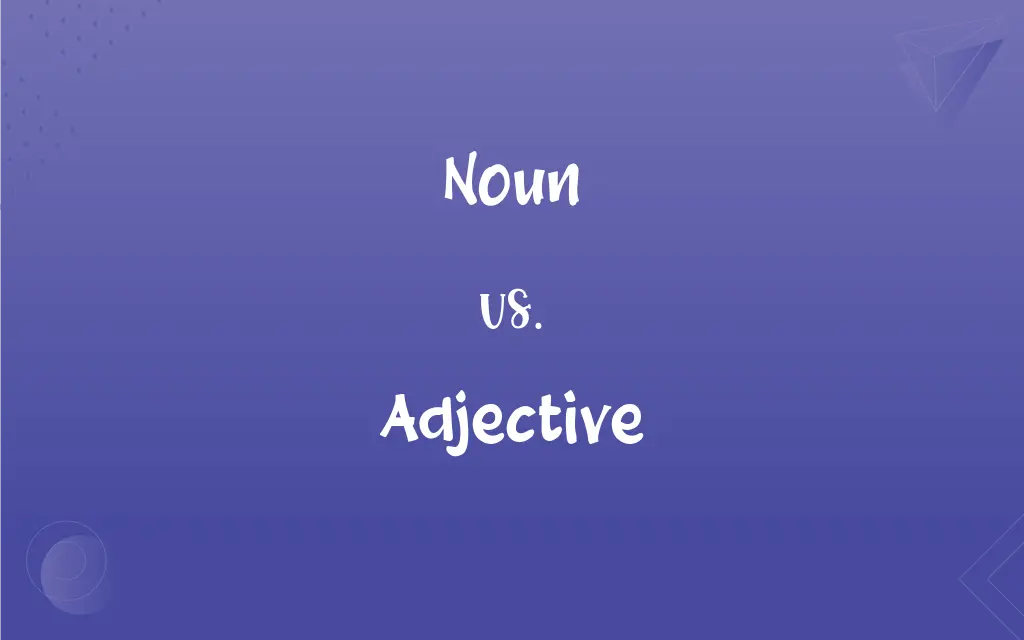Noun vs. Adjective: What's the Difference?
Edited by Aimie Carlson || By Harlon Moss || Updated on October 24, 2023
A noun names a person, place, thing, or idea, while an adjective describes or modifies a noun by providing additional information about its attributes.

Key Differences
In the realm of grammar, a noun stands as a foundational element, representing people, places, things, or ideas. An adjective, on the other hand, works in tandem with a noun, offering a more detailed depiction by highlighting its qualities or characteristics.
While a noun serves as the subject or object in a sentence, creating the core of the message, an adjective enhances this core. It adds color, depth, or specificity, enabling more vivid and precise communication.
A single noun can be paired with multiple adjectives, each adding a different facet of description. Conversely, an adjective typically modifies a specific noun, underlining a particular trait or quality about it.
The role of a noun is often pivotal, as it can stand alone in conveying meaning in a sentence. In contrast, an adjective always relies on the presence of a noun to showcase its descriptive purpose.
Both nouns and adjectives have diverse forms and can undergo changes based on number, degree, and comparison. However, while nouns can be singular or plural, adjectives can be positive, comparative, or superlative.
ADVERTISEMENT
Comparison Chart
Function
Names a person, place, thing, or idea.
Describes or modifies a noun.
Position
Can serve as subject or object in a sentence.
Typically precedes or follows the noun it modifies.
Dependence
Can stand alone.
Relies on a noun to convey its descriptive meaning.
Variability
Can be singular or plural.
Can be positive, comparative, or superlative.
Examples
Dog, city, love.
Happy, larger, brightest.
ADVERTISEMENT
Noun and Adjective Definitions
Noun
A word that signifies an idea, action, or state.
Freedom is a fundamental right.
Adjective
A word that describes or modifies a noun.
The red apple looks juicy.
Noun
A label for entities, feelings, or concepts.
Happiness is a state of mind.
Adjective
A word that can indicate quantity, quality, or size.
She has three cats.
Noun
A term that can function as the subject or object in a sentence.
The ball rolled down the hill.
Adjective
A descriptor that can be used in comparison.
This is the best ice cream I've ever had.
Noun
A word that represents a person, place, or thing.
The cat sat on the mat.
Adjective
A word that adds specificity to nouns.
The ancient civilization had many secrets.
Noun
A word that can possess or be possessed.
That is Maria's book.
Adjective
A term that tells more about a particular noun by highlighting its attributes.
The noisy crowd cheered for the team.
Noun
The part of speech that is used to name a person, place, thing, quality, or action and can function as the subject or object of a verb, the object of a preposition, or an appositive.
Adjective
The part of speech that modifies a noun or other substantive by limiting, qualifying, or specifying and distinguished in English morphologically by one of several suffixes, such as -able, -ous, -er, and -est, or syntactically by position directly preceding a noun or nominal phrase.
FAQs
Can an adjective be used without a noun?
Typically, an adjective is used with a noun to provide description.
Give an example of a plural noun.
Dogs, trees, and cars are examples of plural nouns.
What is an adjective?
An adjective is a word that describes or modifies a noun.
Is "running" in "running water" a noun?
Yes, it's a gerund, a noun form of a verb.
What is a comparative adjective?
It compares differences between objects, like "bigger" or "smarter."
Can a noun also be an adjective?
Yes, in some contexts, like "chicken soup" where "chicken" acts as an adjective.
Are there different types of adjectives?
Yes, including descriptive, quantitative, demonstrative, possessive, and interrogative adjectives.
Can a phrase act as a noun?
Yes, noun phrases combine words to represent a single entity, like "a slice of pie."
How can I identify an adjective in a sentence?
Look for words that describe or modify nouns, often indicating color, size, quantity, or emotion.
Are proper nouns capitalized?
Yes, proper nouns like names and places are always capitalized.
What does a possessive adjective indicate?
It shows ownership, like "my," "your," or "their."
Can adjectives be before or after nouns?
While adjectives often precede nouns in English, they can follow nouns in certain structures, like "something different."
Can a noun act as a subject and object in the same sentence?
Yes, for instance: "The dog chased the cat."
How is the superlative form of an adjective used?
It denotes the highest degree of something, like "brightest" or "most beautiful."
What are coordinate adjectives?
These are two or more adjectives that separately modify a noun, like "a big, red balloon."
Can adjectives be used in a series?
Yes, like "a tall, dark, handsome man."
What is a noun?
A noun is a word that names a person, place, thing, or idea.
Can a noun stand alone in a sentence?
Yes, a noun can stand alone as it represents entities, ideas, or things.
What's an abstract noun?
An abstract noun represents an idea or feeling, like "love" or "freedom."
What's a collective noun?
A noun that represents a group, like "team" or "flock."
About Author
Written by
Harlon MossHarlon is a seasoned quality moderator and accomplished content writer for Difference Wiki. An alumnus of the prestigious University of California, he earned his degree in Computer Science. Leveraging his academic background, Harlon brings a meticulous and informed perspective to his work, ensuring content accuracy and excellence.
Edited by
Aimie CarlsonAimie Carlson, holding a master's degree in English literature, is a fervent English language enthusiast. She lends her writing talents to Difference Wiki, a prominent website that specializes in comparisons, offering readers insightful analyses that both captivate and inform.































































